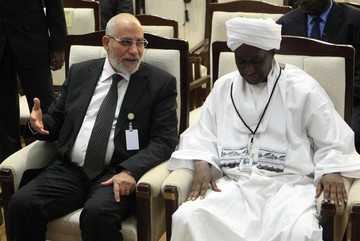Sudan’s Islamic movement condemns Egypt “coup”
July 6, 2013, (KHARTOUM) – The Sudanese Islamic Movement (IM) has described the ouster of the former Egyptian president Mohamed Morsi as a “clear violation of the democratic rules”.

According to the statement, reinstating Morsi would maintain the unity of the Egyptian people and help them avoid slipping into chaos and violence.
The statement further said that some international powers are trying to rule our countries, calling upon Egyptian political forces and people to be vigilant and block Egypt’s true enemies who seek to weaken it and strip it of its regional and international role.
The IM is the religious wing of the National Islamic Front (NIF) which overthrew the democratically elected government in Sudan in 1989.
In its current version, the IM was created by Sudan’s ruling National Congress Party (NCP), following the 1999 schism with its former leader Hassan Al-Turabi and his supporters who formed the Popular Congress Party (PCP).
The IM was designed to exist as a parallel and broader political base to support the Islamist orientation of the NCP regime and rally Sufi and radical Islamist groups under its umbrella, while excluding the PCP.
Sudan’s ruling NCP dominates the IM with Sudan’s NCP Vice President Ali Osman Mohammed Taha serving as its Secretary General from 2004 until 2012 when he was replaced by former finance minister al-Zubeir Mohamed al-Hassan.
The Sudanese government and the NCP have avoided taking sides in the Egyptian side and insisted that it is an internal matter.
Some observers have noted that Khartoum is treading carefully even though it is sympathetic with the deposed Islamist leader, it is also keen on not angering the new power holders in Cairo.
Huge protests were staged on June 30 to pressure Morsi into resigning amid growing anger at economic stagnation and the perception among many that the Brotherhood was seeking to take control of every part of the state – a charge it fiercely denies.
Millions took to the streets to cheer his ouster on Wednesday, but for many Islamists it was a bitter reversal that raised fears of a return to the suppression they endured for decades under autocratic rulers.
The military said it had not carried out a coup, but merely enforced the will of the people.
Unlike most Arab leaders, the Sudanese president has yet to congratulate head of the Egyptian constitutional Adli Mansour who was tapped to become the interim head of state.
(ST)
